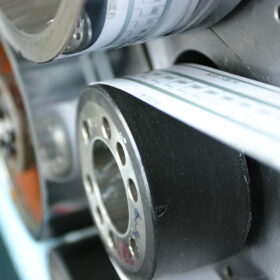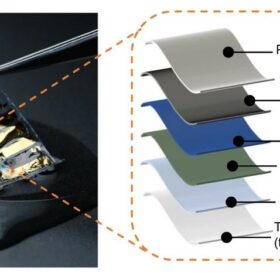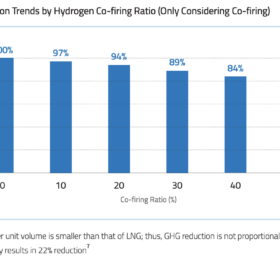BlackRock’s climate infrastructure unit increases stake in Brite Energy Partners
BlackRock’s climate infrastructure business has increased its stake in Brite Energy Partners. The KRW 100 billion ($72 million) investment will help to scale the South Korean independent power producer’s solar portfolio and expand its energy storage and EV charging operations.
Shinsung E&G secures 47 MW module order for floating solar in South Korea
South Korea’s Shinsung E&G says it will supply 47 MW of modules for the country’s first integrated renewable energy complex. It also recently signed an agreement to expand the deployment of rooftop solar in South Korea.
Using digital twin, roll-to-roll platform to design high-performance organic PV devices
An international team of researchers have demonstrated how to speed up the research and development of scalable, high-performing organic solar cells by using an automated, high-throughput platform. It relies on digital twin technology and roll-to-roll (R2R) printing in a closed-loop system.
Korean researchers propose new design for aluminum frames used in glass-glass bifacial solar modules
Using a surrogate model for finite element analysis, the scientists have designed an aluminum frame for bifacial modules that reportedly minimizes deflection and production costs, without adding too much weight. Deflection can lead to cracking or delamination of ribbons inside the module, resulting in an increase number of damaged cells.
Fire at South Korea primary lithium battery factory kills 22
At least 22 people, most of them foreign nationals, were killed in a massive fire at a South Korean factory that manufactures non-rechargeable lithium batteries in Hwaseong city, just south of Seoul. The cause of the blaze is still being investigated.
Researchers build 24.4%-efficient perovskite solar cells with room temperature process
Researchers from the U.S. and South Korea have developed a method to make high-quality perovskite films at room temperature. The film was tested in a conventional perovskite solar cell architecture and the result was a power conversion efficiency of exceeding 24%.
High-efficiency, all-solid-state sodium-air battery achieves energy efficiency of 86%
Researchers in South Korea have successfully demonstrated the use of free ambient air as a fuel leveraging a sodium-based solid electrolyte to tackle the carbonate issue that has been holding back the rollout of metal-air batteries. Their sodium-air battery cell has demonstrated high efficiency, incresed energy density, and a broad voltage range.
Japanese researchers build 14.3%-efficient bendable, waterproof organic solar cell
Researchers from Japan’s Riken Center for Emergent Matter Science have fabricated an organic solar cell that has achieved waterproofness without reducing flexibility. At 3 micrometers thick, it is thought to be the first cell of its kind to survive a washing machine cycle and retain efficiency after multiple cycles.
The Hydrogen Stream: Climate group dampens hopes for blue hydrogen
Solutions for Our Climate (SFOC) says in a new report that blue hydrogen might not be an effective climate solution, while TotalEnergies and its partners have agreed to explore green hydrogen potential in Tunisia.
Daewoo releases hybrid battery-inverters for residential PV
Daewoo’s new hybrid inverters feature LiFePO4 batteries. They are available in six variants, with power ratings ranging from 0.5 kVA to 10 kVA.










